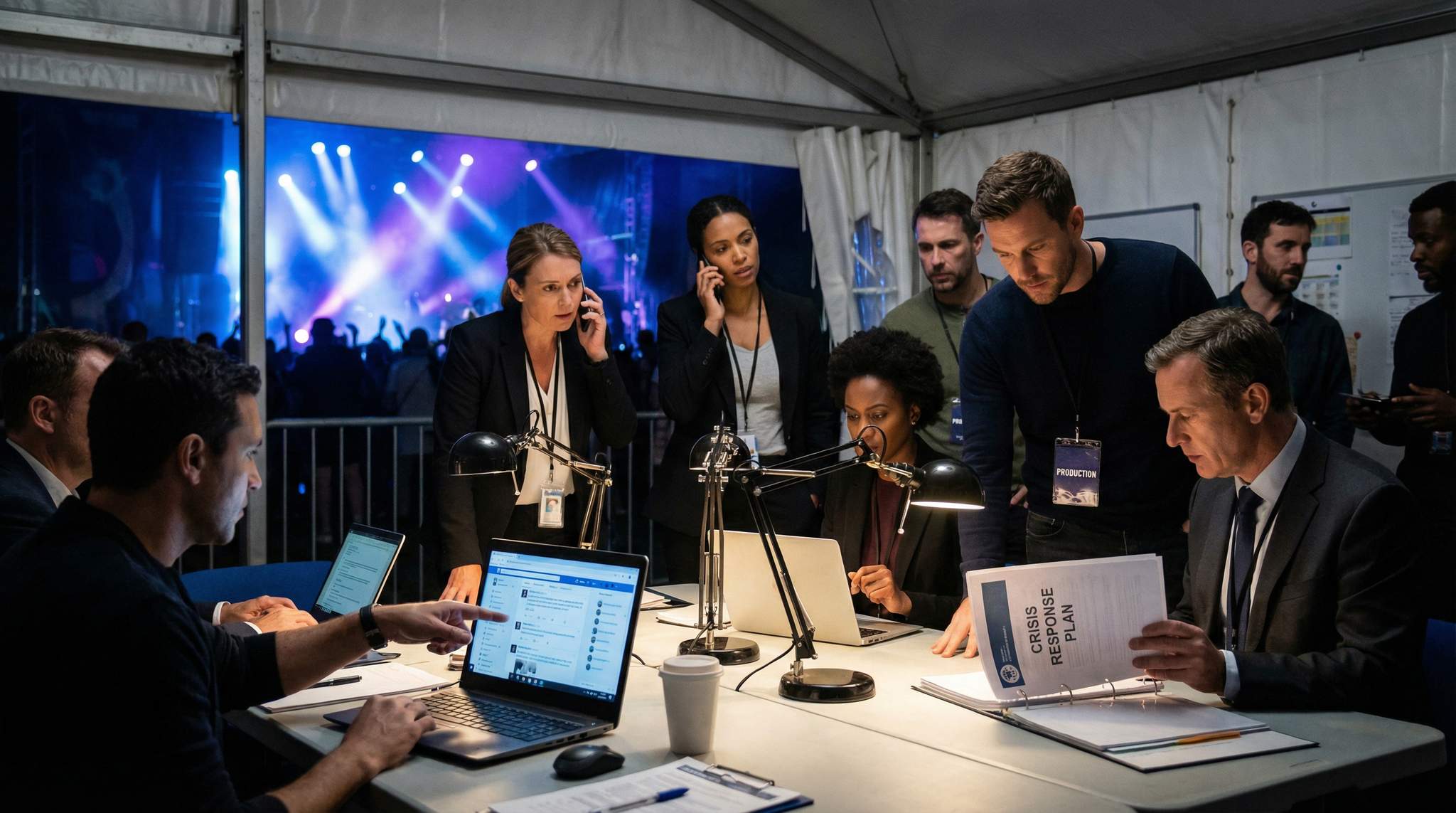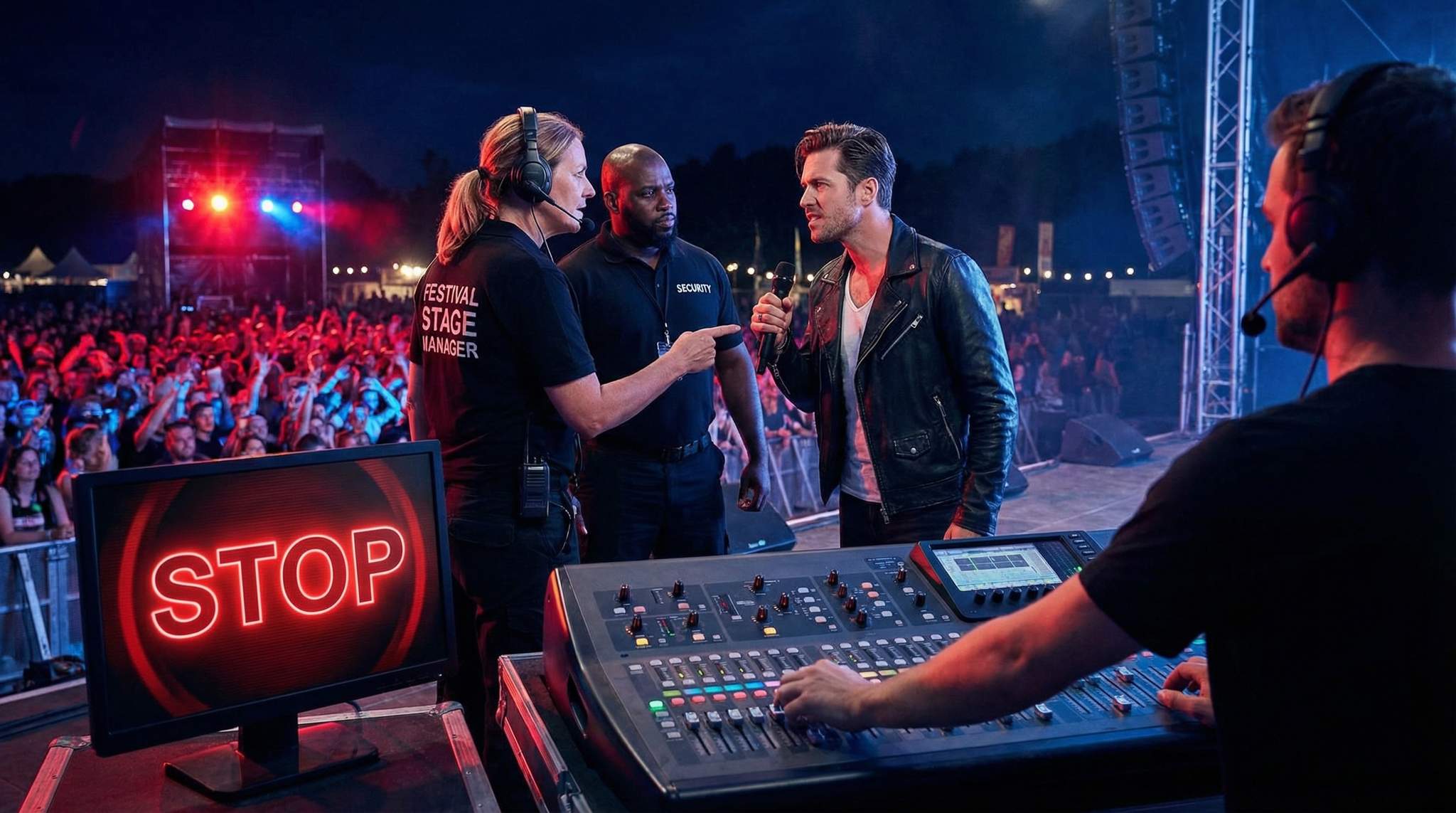Understanding Reputation and Legal Crises at Festivals
Festival crises aren’t always about weather or technical failures. Often, the most challenging emergencies involve legal issues or public relations nightmares. These can range from a serious attendee injury or fatality, to an artist’s controversial on-stage act that causes public outrage, or even a sudden permit challenge that threatens to shut down the event mid-way. In such situations, how organizers respond in the moment can make the difference between a recovered reputation or lasting damage. Every festival – whether a small community fair or a massive international music weekend – must be ready to manage not just the operational side of a crisis, but also the public communications and legal fallout.
Common reputation/legal crises to plan for include:
- Serious attendee injuries or medical incidents: e.g. a fatal accident, overdose, or other life-threatening incident on-site.
- Artist controversies: a performer does something unexpected that offends laws or public sensibilities (for example, using hate speech or a provocative stunt).
- Permit and regulatory challenges: authorities threatening to pull permits, shut down stages, or evacuate the venue due to safety non-compliance, crowd issues, or other disputes.
The ripple effects of these scenarios can be huge. News travels fast on social media and news outlets, so a minor issue can quickly turn into national headlines if mishandled. Being prepared with a solid plan for legal and PR crises is just as important as having emergency medical services or security on site.
Always Have a Crisis Plan (and Team) in Place
Experienced festival producers stress that preparation is everything. Before your event even begins, assemble a crisis management team that can jump into action if something goes wrong. This team should include key decision-makers and experts:
- Festival Director / Team Leader: Someone with the authority to make tough calls (like canceling a show or issuing a public statement) quickly.
- Legal Counsel: An attorney (or access to one) who understands live events, permits, and liability. They ensure any actions or statements protect the festival legally.
- Public Relations Lead: A PR or communications professional to craft messaging, handle press, and monitor social media.
- Safety and Security Leads: Your chief of security or safety officer to coordinate operational response and interface with emergency services.
- Artist Relations / Stage Manager: In case an artist-related issue arises, someone who can liaise with performers and their management calmly.
All staff should know who is on this crisis team and how to reach them instantly. In a crisis, minutes count – wasting time figuring out roles or contact info can worsen the damage. For large festivals, consider running brief drills or scenario run-throughs so everyone understands the chain of command. Even smaller events can benefit from a quick team meeting about “if X or Y happens, here’s our plan.”
Planning a Festival?
Ticket Fairy's festival ticketing platform handles multi-day passes, RFID wristbands, and complex festival operations.
Legal Counsel on Standby
Having a lawyer on standby (or an experienced legal advisor in the production office) is invaluable during a crisis. Legal counsel can provide immediate guidance on decisions that have legal implications. For example:
- If there’s a serious attendee injury or worse, legal counsel will advise on interacting with law enforcement, preserving evidence, and not making any inadvertent admissions of fault. They will remind the team what information can be shared publicly and what shouldn’t (to avoid legal liability).
- In the event of a permit issue or an authority ordering a shutdown, an attorney can quickly review the festival’s permits and help negotiate with officials. They might work to clarify misunderstandings or ensure the festival fulfills any legal requirements to continue operating, if possible. If the event must be halted, legal counsel assists in documenting the order and advising on refund obligations or insurance claims.
- If an artist’s on-stage behavior triggers legal problems (for instance, violating local laws or breaching contract terms), the lawyer will interpret the festival’s artist contract. Most performer agreements have clauses about obeying laws and not disparaging the event or locale. Legal counsel can determine if the artist’s actions constitute a breach and what remedies the festival has (such as fines, contract termination, or legal action). For example, Good Vibes Festival in 2023 was partially shut down after a headlining band’s controversial act violated local laws – the organizers later pursued legal action to recover losses from that band. This illustrates why having counsel ready is essential; they’ll immediately start navigating the legal fallout while the rest of the team manages the event and communications.
Tip: Ensure your insurance provider and broker are notified promptly in a serious incident – often insurance companies can provide legal support or guidance too. And always keep copies of permits, contracts, and insurance policies accessible on site. In a fast-developing crisis, you may need to reference these documents within minutes.
Drafting Holding Statements for Immediate Response
In any crisis, communication is key. The public and your attendees will want information quickly. If you stay silent for too long, speculation and rumors fill the void. This is where holding statements come in. A holding statement is a pre-drafted, general response you can issue immediately to acknowledge a problem while you gather more details.
Why use a holding statement? It buys you time to investigate the situation more fully, yet shows that you are aware and taking action. It prevents a damaging “information vacuum.” A good holding statement is short, factual, and reassures the audience that safety and resolution are top priorities. For example:
“We are aware of an incident that occurred at the festival and are actively working with emergency services. The safety of our attendees is our utmost priority. We will provide further updates as soon as possible.”
Need Festival Funding?
Get the capital you need to book headliners, secure venues, and scale your festival production.
Draft a few such templates for different scenarios (medical emergency, weather evacuation, security threat, etc.) before the festival starts. That way, your team isn’t scrambling to wordsmith a message under intense pressure. When something happens, the PR lead or team can fill in relevant details and release the statement within minutes on all appropriate channels (social media, festival app, website, and on-site announcement if needed).
Key principles for crisis communications:
- Speed and transparency: Respond quickly with at least a basic acknowledgment. Don’t hide the fact that something occurred.
- Accuracy over speculation: Only share confirmed facts, and never guess at causes or blame. It’s okay to say “investigations are ongoing” rather than provide unverified information.
- Empathy and concern: Express care for those affected. For instance, if someone is injured, convey that your thoughts are with them and their well-being is the priority.
- Unified messaging: Ensure all team members, especially those answering phones or dealing with the public on site, know what the official statement is. Everyone should convey a consistent story to avoid confusion.
Remember to consider different audiences in your communications. Attendees on the ground need clear instructions (“please move to exit gates calmly…”), while the wider public and media need reassurance and basic facts. Tailor your tone appropriately, but keep it professional in all cases. One festival’s organizers infamously announced a last-minute cancellation with just a three-word social media post – “no festival today” – offering no explanation or apology. That lack of information and tone-deaf approach angered fans and became a textbook case study in how not to handle crisis messaging. The lesson: always respect your audience by keeping them informed with substance and sincerity.
Managing Public Relations During a Crisis
Beyond the initial holding statement, be prepared for ongoing PR management:
- Media inquiries: Designate a spokesperson (often the PR lead or festival director) to handle press questions. This person should be calm under pressure and well-briefed by legal counsel on what can be said. If the situation is severe (like a fatality or major incident), you might hold a brief press conference or issue a detailed press release once you have more information.
- Social media monitoring: Assign team members to watch social channels for misinformation or viral rumors. Address significant falsehoods by correcting them publicly if necessary, but avoid getting into fights online. If one attendee’s tweet falsely claims something, a measured reply from the official account with correct info can help set the record straight for everyone watching.
- Stay human and humble: In the face of crisis, the festival’s voice should come across as neither overly defensive nor robotic. Acknowledge any inconvenience or distress caused. If the festival was at fault for something, a sincere apology goes a long way in rebuilding trust. For example, if a stage runs late and authorities cut power due to curfew, say sorry to the fans and explain the situation – don’t shift blame or act indignant. Audiences remember how you made them feel during tough times.
- Internal communication: Keep your staff and volunteers in the loop as much as is appropriate. They are your on-the-ground ambassadors to attendees. Give them talking points so they can answer questions like “Why is this stage closed?” or “What’s going on?” accurately and helpfully. A well-informed crew can prevent panic and frustration from spreading.
During a PR crisis, it’s often tempting to react emotionally, especially on social media. Avoid that. An ill-considered comment or a flippant response can pour fuel on the fire. (We’ve seen organizers who responded to upset ticket-holders with sarcasm or anger – it never ends well). Take a moment, get counsel’s input if needed, and respond thoughtfully. When in doubt, stick to your prepared messages and emphasize what actions are being taken to resolve the issue.
Preparing for Cancellation or Evacuation Orders
One of the toughest calls a festival organizer might face is being told by authorities to shut down the event or evacuate attendees for safety reasons. This could happen due to:
- A severe weather emergency (lightning storm, high winds, etc.),
- A security threat or civil disturbance,
- A permit being revoked or an injunction (for example, a court or city order halting the event),
- A major incident like a death or structural failure that makes continuing unsafe.
Having a plan for cancellation/evacuation is critical:
- Clear protocols: Outline how the decision to evacuate or cancel will be made and communicated. Usually, this involves the festival director in consultation with police/fire officials and safety officers.
- Audience communication: If you must stop a show or clear the venue, announce it calmly over the PA and on video screens if available. Provide straightforward instructions (e.g., “Due to unforeseen circumstances, we must pause the show. Please proceed slowly to the nearest exit and follow staff directions.”). Assure people that they are safe and that you’re handling the situation, if that’s the case.
- Preventing panic: Work with security to open all necessary exit routes. Staff should be stationed to guide the crowd and help anyone with mobility issues. Sometimes a staggered exit (releasing one area at a time) can avoid bottlenecks, but this depends on the urgency of the threat.
- Aftermath and refunds: Quickly decide and announce what will happen next. Is the event postponed, or completely canceled? Will tickets be refunded or honored at a later date? It’s essential to address these questions as soon as possible to maintain goodwill. For instance, when the final day of New York’s Electric Zoo music festival 2013 was canceled on short notice by city order (after multiple medical emergencies), the promoters immediately communicated that ticket-holders would receive refunds for the canceled day. Even though fans were disappointed, they at least had clear information on next steps.
It’s worth running through a worst-case scenario in advance: If we had to clear out this entire venue in a hurry, how would we do it safely and who says what? Identify any weak spots in your site plan (for example, is there an alternate exit if one gate becomes unusable?). By thinking this through early, you won’t be caught completely off-guard if it happens.
Also, make sure to comply with any official directives to the letter. If the fire marshal or police commander on site says stop the show, stop it immediately. Arguing on the spot or dragging your feet not only endangers people but can also destroy your credibility and invite legal trouble. You will have time later to discuss or contest permit issues, but in the heat of the moment safety comes first.
Handling the Legal and Reputation Fallout
Once the immediate crisis is over, the work isn’t finished. How you handle the days and weeks after can significantly impact your festival’s long-term reputation and legal liability.
On the legal side:
- Report and document: If there was an injury or security incident, file any required reports with local authorities promptly. Document everything your team did in response (timelines of decisions, communications, etc.). This record will be invaluable if any legal questions arise later.
- Engage insurance and legal follow-up: Notify your insurance carrier of the incident as required by your policy. They may assign an investigator or attorney. If you anticipate lawsuits (for example, from injured parties), consult with your legal counsel about next steps and do not make further public statements on fault or responsibility without advice.
- Contractual obligations: Review any vendor, artist, or venue contracts that might be affected. Will suppliers still be paid? Does the artist get their full fee if a set was canceled? These issues need addressing quickly and fairly to avoid breach of contract disputes. Many contracts have force majeure clauses for emergencies — know how they apply to your situation.
- Legal aftermath examples: In some high-profile cases, festivals have ended up in court post-crisis. Organizers of a canceled event might seek damages from a party at fault (for instance, suing an artist who caused a shutdown, as mentioned earlier). On the flip side, organizers themselves might be defendants in lawsuits from attendees or artists. Being ready with legal representation and a solid documented account of the incident will put you in the best position to handle any litigation or negotiations.
On the public relations side:
- Follow-up messaging: Issue follow-up communications after the dust has settled. This could be a letter from the festival organizers shared via email and social media that explains what happened in more detail, expresses regret for any harm or inconvenience, and perhaps outlines what will be done to prevent a similar issue in the future. Keep this message honest and accountable — without reopening liability, you can and should show that you care deeply about what occurred.
- Media engagement: If the incident was major, consider arranging interviews or a press Q&A once you have more answers. Showing openness (to a reasonable extent) can rebuild public trust. Have your talking points prepared, emphasize the positive actions taken (e.g., “We evacuated within 8 minutes, which ensured everyone stayed safe”), and be frank about any lessons learned.
- Reputation repair: In the longer term, demonstrate that the festival has learned and improved. This might involve new safety measures, new policies, or even independent reviews. Publicize these improvements as you gear up for your next edition, so stakeholders know that you took the crisis seriously and adapted.
Finally, take care of your team. Crises are stressful and can be emotionally draining. Conduct a debrief session to discuss what went well and what could be improved in your response plan. Support any staff who were directly affected (for example, provide counseling resources if they experienced trauma). A festival is a community, and how you treat your community during and after a crisis speaks volumes about your event’s values.
Key Takeaways
- Anticipate reputation and legal crises: Don’t assume “it won’t happen to us.” Plan for scenarios like injuries, artist incidents, or permit issues with the same detail as you would for weather or technical problems.
- Form a crisis response team: Identify who will handle decision-making, legal matters, communications, and operations during a crisis. Make sure everyone knows their role and how to reach key personnel 24/7 during the event.
- Have legal and PR help at the ready: Legal counsel should be on call to advise on liability and compliance in real time. A PR lead should have holding statements drafted and communications channels primed for rapid updates.
- Act fast but communicate thoughtfully: In a crisis, get the essential information out quickly (acknowledge the issue, ensure safety, promise updates). Avoid speculation and maintain a compassionate, professional tone.
- Cooperate with authorities and put safety first: If officials or conditions require shutting down or evacuating, do it without hesitation. You can sort out financial or legal repercussions later – lives and safety are the immediate priority.
- Post-crisis, address the aftermath: Provide refunds or other remedies as appropriate and explain the next steps to your attendees. Be transparent about what happened once you have the facts, and show that you’re taking steps to rectify issues.
- Learn and adapt: Treat every crisis as a learning experience. Update your contingency plans based on what you observed. By continually improving your readiness, you protect both your festival-goers and your festival’s future.





